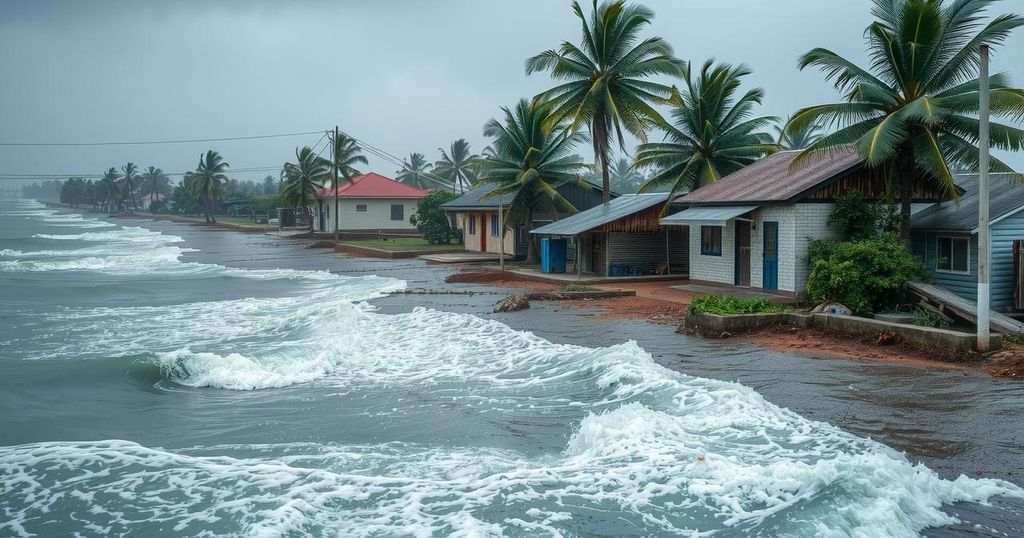Impact of Cyclone Chido in Mozambique: A Humanitarian Crisis in the Making

Cyclone Chido has struck northern Mozambique, causing severe destruction and displacing thousands in Cabo Delgado and Nampula. UNHCR, in collaboration with the local government, has mobilized resources for immediate relief. With preliminary assessments indicating 190,000 people in need and significant damage to educational and housing infrastructure, concerns for vulnerable communities are escalating, particularly as the rainy season looms.
Tropical Cyclone Chido has wreaked havoc in northern Mozambique, particularly in the provinces of Cabo Delgado and Nampula. The cyclone unleashed torrential rains and fierce winds, resulting in the destruction of homes and the displacement of thousands of individuals. The storm has significantly damaged infrastructure, including roads and communication networks, complicating relief efforts in regions that already accommodate substantial populations of internally displaced persons. In response, the UN Refugee Agency (UNHCR) has mobilized resources to assist these vulnerable communities, collaborating closely with the Mozambican government and humanitarian organizations.
Within 48 hours following the disaster, UNHCR established operations at a major accommodation center in Pemba, the capital of Cabo Delgado. There, over 2,600 affected individuals received essential supplies such as blankets, sleeping mats, and emergency shelter essentials. Additionally, UNHCR is actively providing critical protection services to assist the most vulnerable populations.
The full scope of the cyclone’s devastation in rural areas remains uncertain, yet initial evaluations indicate that approximately 190,000 people are in urgent need of humanitarian aid. The cyclone has damaged around 33 schools and obliterated nearly 10,000 homes, leaving some villages with virtually no standing structures. The ongoing conflict, forced displacement, and economic challenges have compounded the vulnerability of these communities. For many, Cyclone Chido has exacerbated their suffering, erasing the small progress they had made towards recovery.
Prior to the cyclone’s landfall, UNHCR and its partners strategically pre-positioned emergency supplies and facilitated widespread disaster preparedness communications through various media outlets and local networks. In Nampula, while several regions experienced impacts from the storm, the Maratane refugee camp, home to over 8,000 refugees fleeing violence from the Democratic Republic of the Congo and Burundi, reported minimal damage, indicating the effectiveness of recent initiatives to construct climate-resilient housing.
Furthermore, Cyclone Chido also significantly impacted Mayotte, a French overseas territory, causing loss of life and widespread damage to infrastructure. The cyclone’s aftermath poses heightened threats for particularly vulnerable groups, including refugees and asylum seekers. UNHCR remains vigilant, coordinating its response with local partners, while also addressing the damage inflicted in southern Malawi where infrastructure has been severely affected.
The alarming prospect of a prolonged and destructive rainy season looms, raising concerns that Cyclone Chido marks the beginning of a series of catastrophic weather events. Displaced populations and their host communities, already grappling with recovery challenges, encounter further risks of displacement and loss. It is evident that the impacts of climate change disproportionately burden the most vulnerable.
UNHCR reaffirms its commitment to supporting the affected communities in Mozambique and neighboring regions, collaborating with governmental and humanitarian partners. However, there is an urgent need for increased resources, as the demand for assistance is anticipated to rise steeply in the coming days.
Cyclone Chido’s landfall in Mozambique highlights the increasing frequency and severity of tropical cyclones in the region, which is compounded by the ongoing challenges of displacement due to conflict and economic instability. The UN Refugee Agency (UNHCR) is actively involved in disaster response efforts in Mozambique, focusing on providing humanitarian assistance to affected populations while also advocating for better disaster preparedness. The region’s vulnerability is exacerbated by climate change, making it critical for humanitarian organizations to address both immediate needs and long-term resilience planning for communities.
In conclusion, Tropical Cyclone Chido has left a path of destruction in northern Mozambique, displacing thousands and causing widespread damage to infrastructure and homes. UNHCR has initiated immediate relief efforts but faces challenges due to resource shortages. The situation underscores the urgent need for enhanced disaster preparedness and climate resilience strategies in vulnerable regions. As the rainy season approaches, the risks for displaced communities remain high, necessitating sustained humanitarian support.
Original Source: www.unhcr.org







